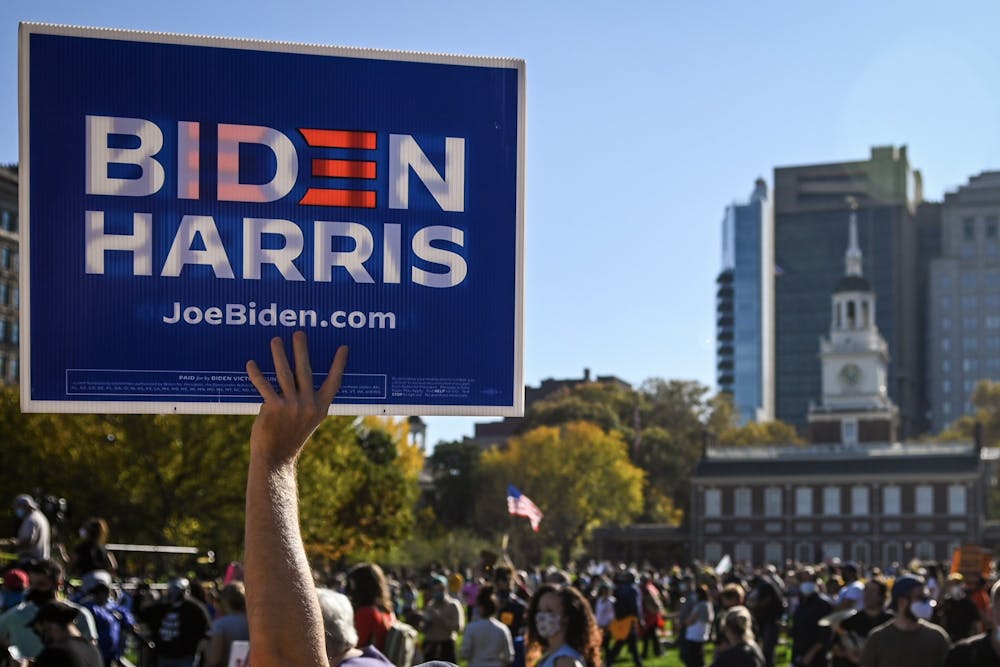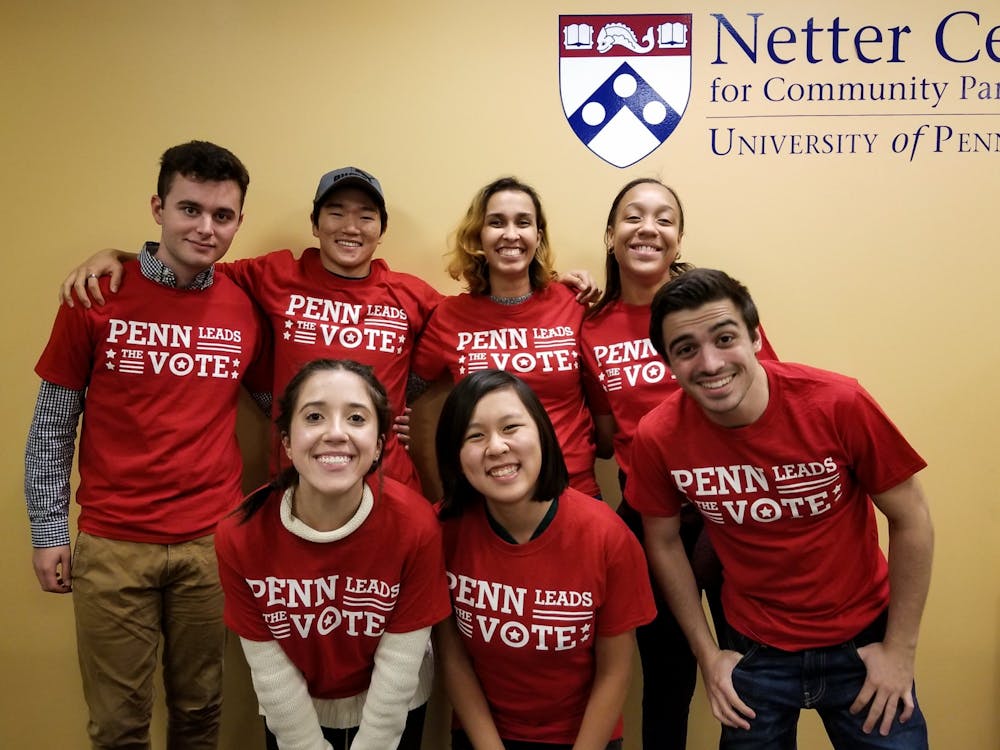
After pouring countless hours into President-elect Joe Biden’s presidential campaign, Penn students and recent graduates said their work to get the former Penn Presidential Professor of Practice back into the White House has finally paid off.
In the final week of the campaign, many campaign workers switched from remote to in-person work, canvassing and monitoring polling locations, pulling out all the stops to secure a Biden victory. Now that the campaign is over, these students and recent graduates are looking toward the future with optimism and pride in what they accomplished in this historic election.
2020 College graduate Seth Schuster, a former Daily Pennsylvanian staffer, began working for Joe Biden’s presidential campaign in July 2019 as a communications intern before being promoted to a communications fellow in September 2019 and a national communications assistant in June 2020.
Schuster primarily worked on sending out press releases, monitoring media conversations, and preparing the president-elect’s “news cards,” which primed Biden with talking points on the top news stories each day.
When Biden announced his candidacy in 2019, Schuster immediately applied for a job on the campaign, in part because he felt a personal connection with Biden after his father died of glioblastoma in July 2017, the same form of brain cancer that led to the death of Biden's son Beau in 2015.
“Aside from the incredible importance of the political moment, for a figure like Joe Biden to come in, and remedy a lot of the crises going on in America, I have this personal connection, whether [Biden] felt it or not,” Schuster said. “I felt if nothing else, that my service on this campaign could be sort of a thank you for all that he had done for me.”
Biden had given Schuster the strength to cope with the tragedy of a family member's death to brain cancer.
When the President-elect delivered a guest lecture in 2018 for COMM 217: "New Media Journalism and Politics in the Trump Era," Schuster took this opportunity to speak to Biden one-on-one. Once the class ended, Schuster chased Biden out the door, winning a few moments to connect with him and ultimately receiving Biden's address so he could share his story in more detail.
“Being able to wake up every morning and have this sense of purpose, which Joe Biden often talks about, particularly when dealing with grief and loss,” Schuster said. “I definitely feel like this experience afforded me the opportunity to find some purpose.”
Schuster said that although the campaign was a lot of work — requiring 16 or 17-hour days and constant attention to his email and the news — it was all worth it. Although he does not know what is next for him now that the campaign is over, he is certain he would accept a position in the Biden administration if offered one.

College junior Rachel Zaff, who is taking a gap year, also worked for the Biden campaign full time as a field organizer in Palm Beach County, Florida. Zaff spent 70 hours each week coordinating a team of around 50 volunteers to run virtual phone bank hubs and urge voters to head to the polls and vote for Biden.
Although she completed most of her work from her off-campus apartment in Philadelphia, in the final week of the campaign she hopped on a flight to Florida to help monitor early voting locations to ensure no voter intimidation took place. At one early voting site, Zaff described Trump supporters blasting “racist Trump speeches” and blocking traffic by waving flags in the middle of the street to prevent voters from entering the parking lot.
“That was very frustrating to see, but our volunteers — we have Biden tents set up with Biden gear and resources for voters — manning all of these sites and managing to keep their cool while these crazy Trump supporters were doing all the antics around them, that was really inspiring,” Zaff said.
Zaff also canvassed during the final push of the election, knocking on about 90 doors in the last 90 minutes before the polls closed on Nov. 3 in a predominantly Democratic area with lower turnout than the campaign had anticipated.
Although President Donald Trump ultimately won Florida, Palm Beach County saw the highest turnout since 1992. Biden won the county by almost 100,000 votes.
Now that the campaign is over, Zaff is figuring out what she will do in the spring before she returns to Penn for her senior year in the fall. Ideally, she said she would find work in the Biden administration dealing with climate policy.
When Trump won the presidency in 2016, 2019 College and School of Social Policy and Practice graduate Benjamin Oh said he knew he had to be a part of the effort to vote him out of office in 2020. Oh took a leave of absence from his role as an Emerson fellow at the Netter Center for Community Partnerships to work for the Pennsylvania Democratic coordinated campaign’s data team.
Working remotely from Maryland, Oh was responsible for helping field organizers in the Bucks and Philadelphia County regions and building online infrastructure to aggregate and report data from phonebanks and outreach. He also volunteered with Asian Americans and Pacific Islanders for Biden, Young Asian Americans for Biden, and Korean Americans for Biden.

“This cycle, given the opportunity to make a difference, particularly in a state that Trump won in 2016, being able to take time to fight not just for myself, but for my family, for friends, the communities that I've been a part of at Penn and away from Penn, it was not a question of whether I would do it or not, because it was just so critical," Oh said.
Now that the campaign is over, he will return to his fellowship position at the Netter Center to advance democratic civic engagement across the Penn community.
College junior Samantha Delman also took time off from Penn to work for the Biden campaign, spending 70 hours a week working as a field organizer in North Philadelphia. Delman called approximately 900 people each week asking them to join her team of over 20 volunteers who were responsible for reaching out to potential voters.
While Delman initially had a difficult time connecting with strangers over the phone, she was moved by the meaningful connections she made with voters over the course of her semester spent working for the campaign.
“Having those good moments where you build genuine relationships with people and have good conversations are so important and definitely what kept me motivated throughout the campaign,” Delman said.
Another student who spent many hours phone banking, Nursing first-year Deborah Olatunji, said her favorite part of the job was putting the Spanish she had learned to use and communicating with Spanish-speaking voters that might not have otherwise been reached by the campaign.
Olatunji worked to get Biden elected as a Youth Penn Fellow at NextGen America, an organization focused on increasing youth voter turnout and winning elections for progressive candidates. She spent 15 hours a week phone banking and text banking while taking classes at Penn from her on-campus dorm.
“I wanted to be able to say about my freshman fall that I had done something really beneficial for the Philadelphia community,” Olatunji said.
In the final five days of the campaign, she said her responsibilities went “through the roof,” making it difficult to balance the campaign with school work.
“At the end of the day, I have no regrets, because we accomplished what we wanted to and Black and brown youth really came out to vote in Philadelphia, and our city was a really big turning point for the election,” Olatunji said.
The Daily Pennsylvanian is an independent, student-run newspaper. Please consider making a donation to support the coverage that shapes the University. Your generosity ensures a future of strong journalism at Penn.
Donate



